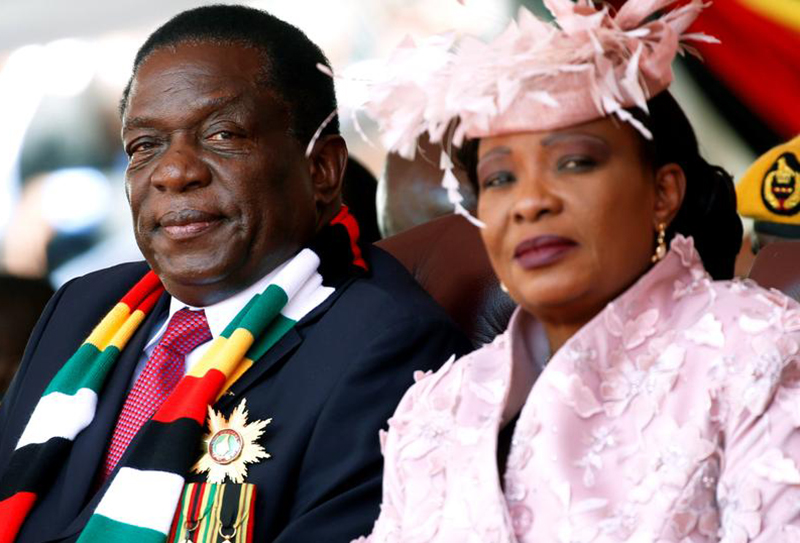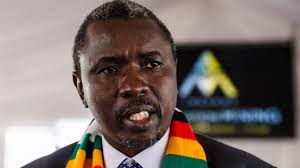President Mnangagwa’s family now under military intelligence-style attack: “They want to strike fear in ED and sons”

President Mnangagwa with his wife Auxilia
The political landscape of Zimbabwe, long marked by power struggles and whispers of intrigue, has taken a chilling turn, with the Mnangagwa family finding themselves at the centre of a disturbing series of incidents that have sent ripples through the nation, The News Hawks has reported.
The events, described by military insiders as “military intelligence-style psychological operations,” bear a chilling resemblance to tactics employed in the past, raising concerns about a deepening power struggle between President Emmerson Mnangagwa and his deputy, Vice-President Constantino Chiwenga.
The first incident, a break-in at the office of Deputy Minister of Tourism and Hospitality Industry, Tongai Mnangagwa, in Harare, occurred between 5th and 8th July. The police, confirming their investigation, stated:
“The Zimbabwe Republic Police confirms that investigations are being conducted in connection with a report of alleged break in at the office of the Deputy Minister of Tourism and Hospitality Industry, Honourable Tongai Mnangagwa in Harare between 5th and 8th July 2024.”
This incident followed a series of unsettling events at the home of Kudakwashe David Mnangagwa, the Deputy Minister of Finance, Economic Development and Investment Promotion, on 23 June, 25 June, and 28 June.
The police, in their statement regarding the incident on 28 June, said: “The Zimbabwe Republic Police confirms that investigations are currently underway in connection with a fire incident which occurred at the house of the Deputy Minister of Finance, Economic Development and Investment Promotion, Honourable Kudakwashe David Mnangagwa on 28 June 2024 at 11.30 PM.”
The events at Kudakwashe’s residence were far from ordinary. Intruders entered his home, leaving bullet cartridges on his bedroom door, taking his laptops into the ceiling, and starting a fire, causing minor damage to his property and stealing some cash. The incident was described by sources as a calculated act of intimidation.
“We don’t know what is happening on these specific issues, but what we do know, particularly in Zimbabwean context, is that such incidents are associated with military intelligence,” a military insider told The NewsHawks. “Military intelligence agencies have been known to use stealthy and intimidating tactics to influence politics and political outcomes. Some of the operational approaches include surveillance, harassment, intimidation, infiltration, coercion, burglary, cyber attacks, and psychological operations. This appears to be that sort of thing. These tactics aim to strike fear into hearts of targets and exert control over officials, influence their decision-making, and maintain military intelligence’s grip on political power.”
The use of these tactics is not unprecedented in Zimbabwe’s political landscape. In January 2016, a group of individuals were arrested for allegedly attempting to petrol-bomb the late former President Robert Mugabe’s Alpha Omega Dairy Farm in Mazowe. One of the suspects claimed the operation was sanctioned by the military, highlighting the deep-seated influence of the military in Zimbabwean politics.
The events of 2016, which were later contextualised as part of a series of events leading to the November 2017 coup and Mugabe’s ouster, serve as a stark reminder of the military’s capacity and willingness to intervene in political affairs.
The current incidents, occurring amidst a period of political uncertainty and speculation about President Mnangagwa’s future, have fuelled speculation that they are either a calculated threat against the Mnangagwa family or a propaganda stunt designed to influence the political landscape.
Last week, President Mnangagwa, under pressure from both political allies and unknown forces, announced his retirement in 2028, the end of his current constitutional term. The announcement came after pressure from his supporters to remain in power until 2030, a move that would have required him to extend his term beyond the constitutional limit.
The military, which has been politicised and weaponised for political outcomes, plays a significant role in Zimbabwean politics. The recent incidents, coupled with the President’s announcement, have raised questions about the extent of the military’s influence and the potential for further instability.






